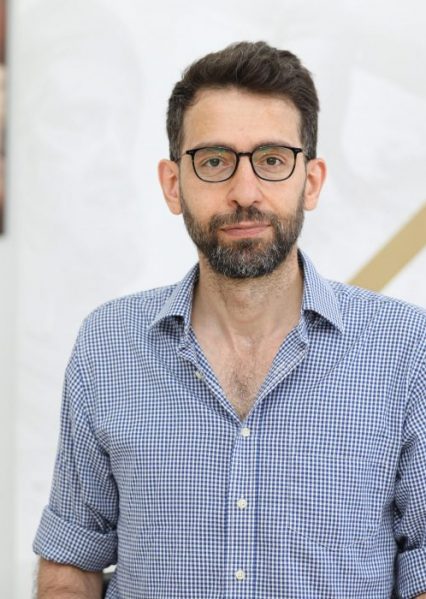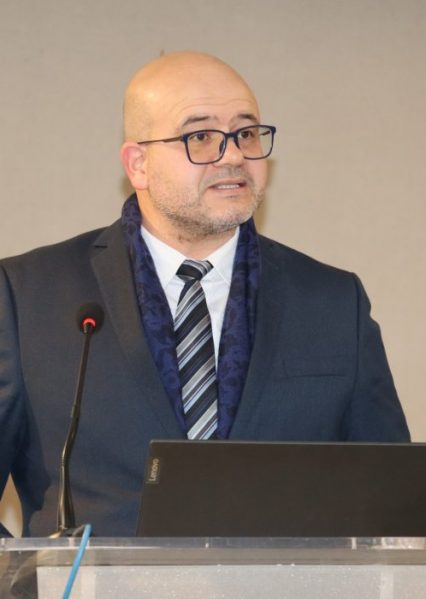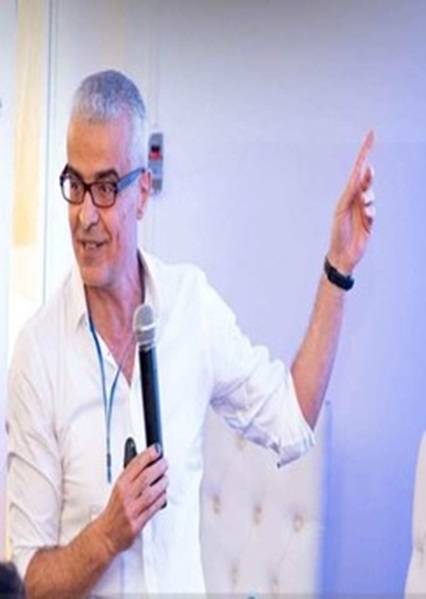Every year, MECAM offers three researchers from its network to come to one of its German partner institutions for a maximum of three months as part of the “Germany Research Visits” program. This gives them the opportunity to present their research to new audiences, use local infrastructures and expand their networks.
Dr. Imad Alsoos
Date of visit: 1 May 2025 to 31 July 2025 (GIGA Institute for Middle East Studies, Hamburg)
Imad Alsoos holds Gerda Henkel Stiftung scholarship to conduct a comparative study of Muslim political thoughts in Mashreq and Maghreb, and examines the way their interactions have influenced the development of Ennahda Party’s political thought in Tunisia. Between 2023 and 2025, he joined MECAM to study Ennahda Party in Tunisia. He earned his PhD in 2017 from the Free University of Berlin, focusing on Hamas’s political discourse and organisational mobilisation in Gaza. Between 2018 and 2023, he joined Max Planck Institute for Social Anthropology to continue his research on Hamas.
Activities:
- Presentation on the topic “Genealogies of Muslim Political Thought in Mashreq and Maghreb: The Case of Ennahda’s Muslim Democracy” as part of IMES Colloquium (GIGA- German Institute for Global and Area Studies) (23 July 2025).

Project carried out during the visit:
This research project conducts a comparative study of Muslim thoughts in Mashreq and Maghreb and then examines the way their interactions have influenced the development of Ennahda Party’s political thought. Ennahda has evolved from a sharia-based approach (1969-1979), through an umma-based approach or Islamic democracy (1981-2010) to a Muslim democracy (ca.2011-present). The latest development represents the most advanced Muslim political thought in terms of the relationship between Islam and the modern model of state and civil society. Tracing Ennahda’s development demands an exploration of the movement’s historical and philosophical origins and the ways in which they have been renegotiated and transformed to adapt to the Tunisian political context. In theoretical and methodological terms, my research builds on Ibn Khaldun and Michael Foucault’s genealogical perspective, which argues that the cross-generational transfer of knowledge has neither a defined beginning nor a linear evolution. As such, Muslim democracy has emerged as a result of disparities between events, actors, unplanned situations and Ennahda’s own agency, which is conditioned by local context.

Dr. Riadh Ben Khalifa
Date of visit: 1 July to 16 July (Forum Transregionale Studien, Berlin)
Riadh Ben Khalifa is an associate Professor of Contemporary History at the University of Tunis, Vice-Dean, Internship director at the Faculty of Human and Social Sciences (since September 2024). Additionally, he is a member of several migration networks. His is redactor in chief of the Tunisian Review of Social Sciences. The research interests of Riadh Ben Khalifa focus on migration, asylum, mobility in transitional contexts.
Activities:
- Lecture on “Historiography of migration in Tunisia: The case of refugees” as part of Workshop organized by Forum Transregionale Studien and Centre Marc Bloch: “Diasporas, Exiles, Migrants, and Refugees from Europe in the Middle East and North Africa” (July 8-10, 2025)
Project carried out during the visit:
My study examines protection systems for child and youth migrants in Tunisia after 2011, within the context of economic crisis, political instability, and growing hostility toward migrants. Although Tunisia has developed a pioneering legal framework for child protection -starting with the 1956 Personal Status Code, the ratification of the Convention on the Rights of the Child in 1991, and the 1995 Child Protection Code – the extension of these rights to migrants remains ambiguous, leaving them highly vulnerable.
The education system, once a driver of social mobility, now reproduces inequalities across regions, socio-economic levels, and gender, with migrant children particularly disadvantaged.Various actors are involved in protection, including ministries, public authorities such as the National Authority for the Fight Against Human Trafficking, and civil society organizations (CSOs). CSOs and international agencies play a vital role in denouncing rights violations, advocating for reforms, and pushing for inclusive policies. Their efforts contributed to the adoption of key laws, such as those against racial discrimination (2018) and human trafficking (2016). Nevertheless, Tunisia’s crisis-ridden context, combined with restrictive labor laws, forces many migrants into informal work. The 2021 trafficking report revealed that over half of identified victims were children, most of them foreigners and women. In sum, Tunisia possesses an advanced child protection framework, but its implementation remains weak. Strengthening collaboration between state institutions, civil society, and international partners is essential to ensure effective protection and inclusion of child and youth migrants.
This research stay enabled me to finalize a scientific article by deepening the analysis of the legal and institutional framework for the protection of child and youth migrants in Tunisia and to compare with other experiences. The findings from this research will contribute to an article that I plan to publish in a collective volume. Furthermore, an interview related to this work will be conducted for the Blog for Transregional Research (Trafo) to share preliminary insights and open the discussion to a wider academic audience.
Dr. Adel Karaa
Date of visit: 19 November 2023 to 22 December 2023 (Philipps-Universität Marburg)
Dr. Adel KARAA is a Full Professor of Quantitative Methods at the Higher Institute of Management-University of Tunis, Member of the National Recruitment Committee of Full and Associate Professors in Quantitative Methods in Tunisia. He is also director of the Graduate School of Management Science and Management Computing of ISGT-ESSECT-TBS, University of Tunis.
Activities:
- Lecture on the topic “Towards an Integrated Model of the Mediating Effect of the Process of Individual Perceptions on the Relationship Between Job Quality and Mobility Intentions” as part of the MACIE Research Seminar (Marburg Center for Institutional Economics) (30 November 2023)
Project carried out during the visit:
Do better employment conditions reduce migration and professional mobility intentions among higher graduate workers in Tunisia? An integrated model of real and perceived job quality.

The aim of this research is to establish an analytical framework for a better comprehension of the phenomena of migration and occupational mobility (turnover), which are increasingly prevalent among young graduates in Tunisia. Faced with the general deterioration in working conditions and job quality in the country, many of young graduates are more and more enticed to seek opportunities elsewhere in the hope of finding better living conditions.
Based on individual data from a survey of a representative sample of 814 higher education graduates working in various sectors and covering all regions of Tunisia, the study used an appropriate theoretical and empirical approach to develop an integrated model that schematically represents the process of managing individual career trajectories in the face of the diverse working conditions and job quality. By retaining a wide range of characteristics (salary, type of contract, social security cover, working conditions, holidays, health insurance, working hours, etc.), empirical investigations have revealed the high degree of heterogeneity in the jobs held by young graduates. In this respect, a typology of jobs is established, showing the existence of five categories that differ according to employment status (salaried vs. self-employed), degree of informality and quality of (environment) working conditions.
The estimated results of the aforementioned model corroborate also the mediating role of the cognitive, affective and emotional dimensions in the relationship between the type of occupation (i.e. objective dimension) and the mobility intentions (i.e. conative dimension) among young graduate workers in Tunisia. One of the main practical implications of this research suggests the need for intervention policies aimed at improving employment conditions, workplace quality and organizational practices that are supportive of employee well-being.

Dr. Elizabeth Bishop
Date of visit: 1 October 2023 to 30 November 2023 (Philipps-Universität Marburg)
Dr. Elizabeth Bishop joined Texas State’s History Department during 2008 with a PhD from the University of Chicago. She teaches undergraduate and graduate courses in her areas of her scholarly expertise—the history of the Middle East, Postcolonial Arab history, the history of the Global Cold War. You can visit her profile here.
Activities:
- Conversation with Diana Abbani on the TRAFO Blog for Transregional Research under the title “Arab Engagement at the World Festival of Youth and Students in the USSR in 1957– A Conversation with Elizabeth Bishop” (15 April 2024)
- Lecture on the topic “Ghosts of Empire in Algeria and Egypt” as part of the seminar “Comparative History of Ottoman and European Imperialism” (Nessim Znaien) (8 November 2023)
- Lecture on “Cholera and Colonialism in the Maghrib: 1830-1837” as part of the seminar “History of the Epidemic, Hygiene and Care in the Maghreb” (Nessim Znaien) (15 November 2023).
Project carried out during the visit:
Under the slogan, “with diplomas, we will not make better corpses”, the UGEMA (L’Union générale des étudiants musulmans algériens) called an indefinite strike for 19 May 1956; this strike marked a turning point in Algeria’s national liberation struggle; with (and without) diplomas, organizers of the students’ strike became leaders for the new nation, eventually serving as cabinet ministers, diplomats, and general directors for the state petroleum company after independence. Understanding MECAM’s primary aim is to create a high-quality and flexible setting for peer-to-peer exchange and debate, I would complete revisions on a monograph regarding UGEMA which was active between 1955 and 1962. Research on this student organization after World War II relates directly to MECAM’s guiding theme “Imagining Futures: Dealing with Disparity” because the population estimate of 1955 introduced a term (“Français d’origine algérienne”) which represented a form of institutionalized disparity, and these students’ struggle for legal recognition brought them into the “imagined future” of the Front de libération nationale (FLN), which culminated in recognition of a République algérienne démocratique et populaire (RADP). Research on UGEMA also relates directly to MECAM’s IFG V, “Identities and Beliefs” because the students attained their legal status through France’s Law of Associations (1901), that guaranteed their administrative autonomy based on their cultural identity.
